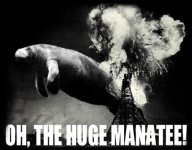I agree with Ron (airfrogusmc) that the OP should read for himself or herself — and I am sure that the OP, like any reasonable person, can figure out which postings in this train wreck of a thread make sense and which don't.
To digress from the discussion on Susan Sontag for a minute, there are many ways to write about the visual arts, including photography. The best book that I read last year is TJ Clark's
Picasso and Truth, which essentially contains an in-depth reading of five paintings completed before and after Cubism, terminating in a discussion of Guernica. Clark concentrates on the nature of the interior space in Picasso's paintings and how it develops — and how this view of reality relates to the
Zeitgeist, expressed through references to some of the writings of Nietzsche and Wittgenstein. It's an excellent short book, whose look into the issues of space in painting that Picasso wrestled with should make you look with new eyes at use of space in your photography.
Although its language is not abstruse or difficult, it's not a book that can be read quickly because the density of ideas will make you slow down and think, which I think is a good thing. Some of the illustrations of the paintings are repeated several times in the book, so that the reader does not have constantly flip back and forth.
Incidentally, in one the endnotes, Clark has a scathing criticism that, often writing on Picasso has focussed on celebrity gossip rather than real analysis — in a swipe at John Richardson's large (currently) three-tome biography. Richardson is easier to read, but writes precious little analytical about Picasso's painting, really nothing that has not been written elsewhere.
Coming back to Sontag, two issues have been bandied about: one is that she's a lousy writer and the other is that what she writes in
On Photography is simply wrongheaded. A lot that has been said in this thread stems either from ignorance or simple prejudice. I have no reason to defend Sontag: although I mentioned that I read
On Photography years ago and don't remember anything; after reading Suzie Linfield's essay, it seems to me that I've never read that book but only have some impressions from what others have written about it. Last night, I read three things that seem so me worthwhile to read if you want to have some idea of what Sontag wrote and how she wrote it.
First, here is a
brief obituary in the Telegraph, published in 2004. Second, here is a
1995 Paris Review interview with Sontag, which provides an idea of her views on writing. And, third, here is an
article by Sontag, titled Looking at War: Photography’s view of devastation and death, published in the
New Yorker in 2002. In it she recants some of her views in
On Photography and, in general, is dazzling in its intellect and expression — in other words, she's an excellent writer.
MITCH ALLAND/Potomac, MD



